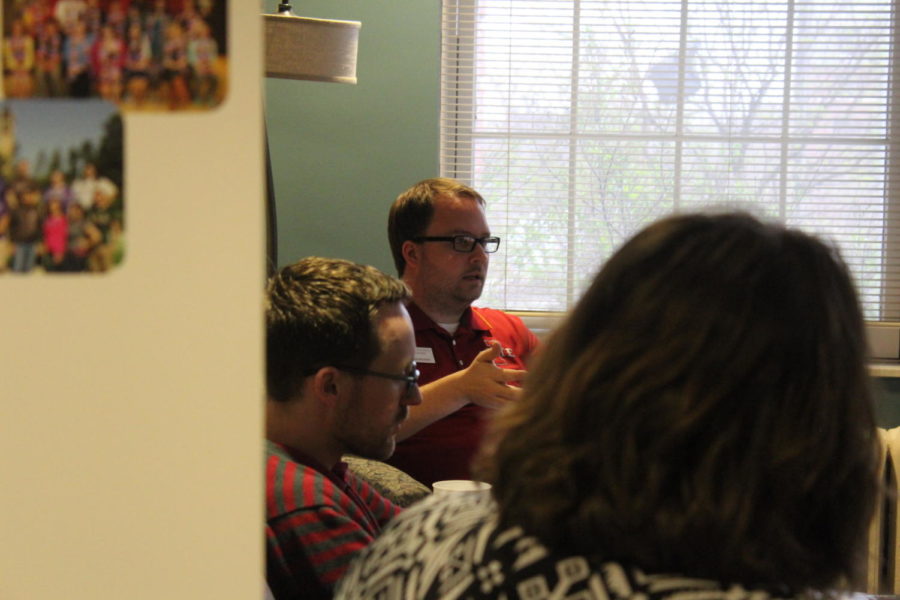LGBT+ advocates strive for inclusivity in new Workday system
Hearing officer in the office of student conduct Joel Hochstein talks during a town hall discussion in the lobby of the Student Services building on April 10. The meeting was for faculty members and students of the LGBT community to voice their opinions about Workday, a student information system and how it can represent them.
April 10, 2017
LGBT+ advocates are looking for ways gender and sexuality identities can be represented in Workday, Iowa State’s new choice of software for student records and finance operations.
The Pride Summit hosted “Making Workday Work for You,” a town hall meeting in the Student Services Center to address issues or concerns the LGBT+ community may have with the future information system.
Those in attendance focused mainly on transgender and gender non-binary identifying students, and potential obstacles while transitioning to Workday.
“I feel like our campus identity extends far beyond the L, G, B and T,” said Brad Freihoefer, director of Lesbian Gay Bisexual Transgender Student Services (LGBTSS). “And [Workday] needs to accommodate for what that means.”
Freihoefer explained that as many students go throughout their college life, they may identify themselves a different way than they did when they got accepted into school. They hope that Iowa State and Workday are able to fit accommodations to varying pronouns and preferred names as students become more educated about themselves.
The group talked about ways students and staff could potentially go about making changes to the information stored onto Workday in their profiles. Nicci Port, coordinator for the Office of Diversity and Inclusion, thought that communication with Workspace is key.
“The thing is, we may have an idea for something but have no idea how to do it,” Port said. “We need to know if this is something that needs to be handled by the individual or if it’s a situation where they can fill out a form and have it taken care of by the office.”
The meeting also suggested ways to make information collected on Workday available to professors and academic advisers. Those at the meeting generally agreed that having pronouns and preferred names readily available on the first day of classes could stop a lot of false assumptions to students’ identities.
“This subject was brought up in the LGBTSS center earlier today with some students,” Freihoefer said. “One student said that it was a great idea because it would save them a lot of time because they always had a lot of emails sent to their teachers before classes started.”
Nevertheless, all in attendance agreed that privacy and protection of students’ information was the top priority. Port suggested that students should be able to identify who has access to their information.
“Then students wouldn’t have to figure out whether they’re coming out to just the professor or a whole class,” she said.
Freihoefer brought up that students should be able to take a “Facebook-like” approach to releasing their information and identity to different parts of the university.
“For example, they could be able to say, ‘I want my pronouns to be available to my adviser, but not my professors,’” they said.
Freihoefer also suggested that students could have the option to have a privacy question or password to look at their own information on Workday. They told a story about a student they had met earlier that day who could not sign up for the LGBTSS emailing list because the student’s parents had access to their email account, and receiving emails from them would be “problematic.” Freihoefer believes Workday should consider the same precautions.
Those at the meeting admitted still not much was known about Workday and how it will function for Iowa State. However, the group remains optimistic with the university’s decision due to Workday’s affiliation with big-name companies such as Amazon, Best Western and Booking.com.
“We need to ask more questions so we can gather more data,” Port said. “We’re getting good information on some groups at Iowa State, but more is obviously ideal.”
















